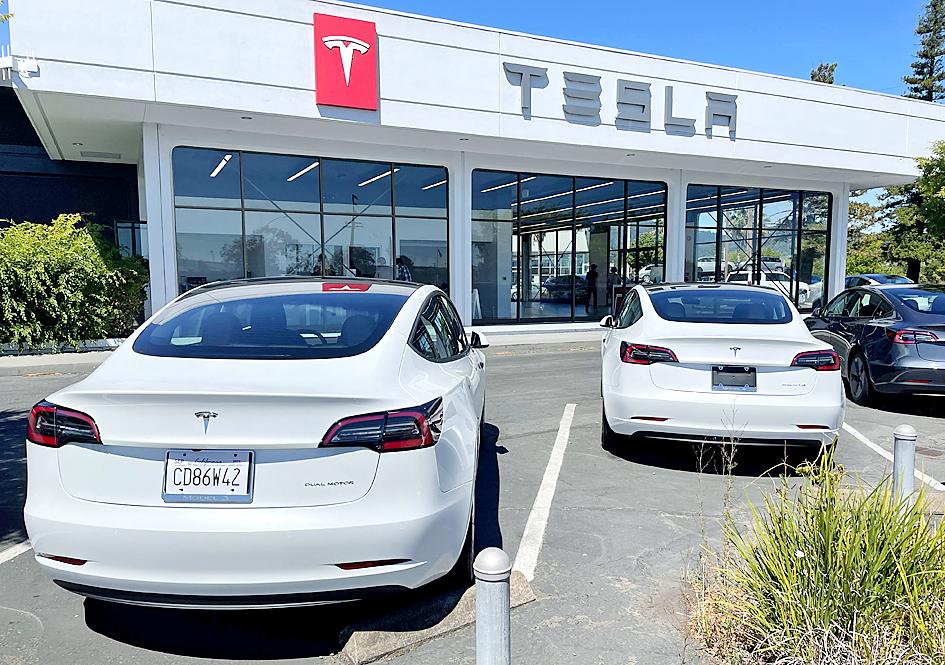Tesla Inc is among a group of companies that have been criticized by investors with more than US$31 trillion in assets for failing to disclose their environmental footprints through global reporting standards.
Amundi SA, Aviva PLC and Nuveen are some of the institutional investors calling on Tesla, Saudi Arabian Oil Co, Exxon Mobil Corp, Glencore PLC, Volvo Group and others to report impacts on the climate, water and forests through CDP, a nonprofit whose disclosure system is used by more than 13,000 companies.
Asset managers targeting environmental, social and governance (ESG) goals have been stepping up pressure on the companies in their portfolios to use consistent reporting metrics as they try to gain clarity and steer clear of potential greenwashing. That is amid growing regulatory scrutiny of the industry and ever-stricter rules designed to slash greenhouse gas emissions before it is too late.

Photo: AFP
“Climate change, deforestation and water security present material risks to investments,” Laurent Babikian, joint global director of capital markets at CDP, said in a statement. “Companies that are failing to disclose their impact risk are trailing behind their competitors in their access to capital.”
This year’s campaign is the sixth coordinated by CDP, with a record 57 percent jump in the number of financial institutions signing up.
Tesla, which is a staple of climate funds due to its dominance in the electric vehicle industry, did not answer e-mails seeking comment.
Tesla chief executive officer Elon Musk has previously criticized the ESG industry, even going so far as to call it a “scam.”
He also railed against ESG investing theory after Tesla was excluded from an S&P Global index that tracks companies’ environmental, social and governance standards.
This year, investors participating in the campaign to convert companies to the CDP reporting system are taking aim at 1,473 firms.
Companies that adhere to CDP standards would be in a better position to deal with stricter ESG regulations once they become a reality, Babikian said.
That comes as the US Securities and Exchange Commission hopes to propose tough climate disclosure rules that, in some cases, would require firms to report indirect, or so-called Scope 3, emissions.
Investors backing the CDP campaign asked most of the companies targeted to report on how their business is affecting climate change.
They also wanted more information on water and forest impacts.
European companies lead the pack in environmental reporting, with about 2,400 firms using the CDP framework, Babikian said.
One in four has science-based emission reduction targets, with more expected, he added.

SELL-OFF: Investors expect tariff-driven volatility as the local boarse reopens today, while analysts say government support and solid fundamentals would steady sentiment Local investors are bracing for a sharp market downturn today as the nation’s financial markets resume trading following a two-day closure for national holidays before the weekend, with sentiment rattled by US President Donald Trump’s sweeping tariff announcement. Trump’s unveiling of new “reciprocal tariffs” on Wednesday triggered a sell-off in global markets, with the FTSE Taiwan Index Futures — a benchmark for Taiwanese equities traded in Singapore — tumbling 9.2 percent over the past two sessions. Meanwhile, the American depositary receipts (ADRs) of Taiwan Semiconductor Manufacturing Co (TSMC, 台積電), the most heavily weighted stock on the TAIEX, plunged 13.8 percent in

A wave of stop-loss selling and panic selling hit Taiwan's stock market at its opening today, with the weighted index plunging 2,086 points — a drop of more than 9.7 percent — marking the largest intraday point and percentage loss on record. The index bottomed out at 19,212.02, while futures were locked limit-down, with more than 1,000 stocks hitting their daily drop limit. Three heavyweight stocks — Taiwan Semiconductor Manufacturing Co (TSMC, 台積電), Hon Hai Precision Industry Co (Foxconn, 鴻海精密) and MediaTek (聯發科) — hit their limit-down prices as soon as the market opened, falling to NT$848 (US$25.54), NT$138.5 and NT$1,295 respectively. TSMC's

TARIFFS: The global ‘panic atmosphere remains strong,’ and foreign investors have continued to sell their holdings since the start of the year, the Ministry of Finance said The government yesterday authorized the activation of its NT$500 billion (US$15.15 billion) National Stabilization Fund (NSF) to prop up the local stock market after two days of sharp falls in reaction to US President Donald Trump’s new import tariffs. The Ministry of Finance said in a statement after the market close that the steering committee of the fund had been given the go-ahead to intervene in the market to bolster Taiwanese shares in a time of crisis. The fund has been authorized to use its assets “to carry out market stabilization tasks as appropriate to maintain the stability of Taiwan’s

In a small town in Paraguay, a showdown is brewing between traditional producers of yerba mate, a bitter herbal tea popular across South America, and miners of a shinier treasure: gold. A rush for the precious metal is pitting mate growers and indigenous groups against the expanding operations of small-scale miners who, until recently, were their neighbors, not nemeses. “They [the miners] have destroyed everything... The canals, springs, swamps,” said Vidal Britez, president of the Yerba Mate Producers’ Association of the town of Paso Yobai, about 210km east of capital Asuncion. “You can see the pollution from the dead fish.